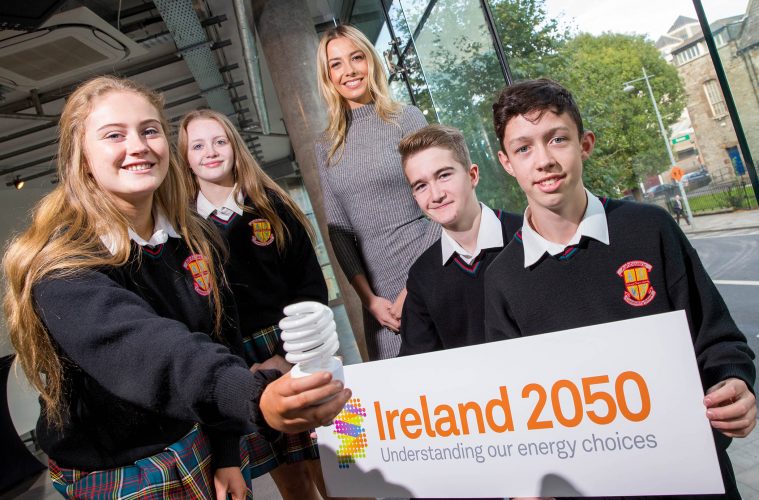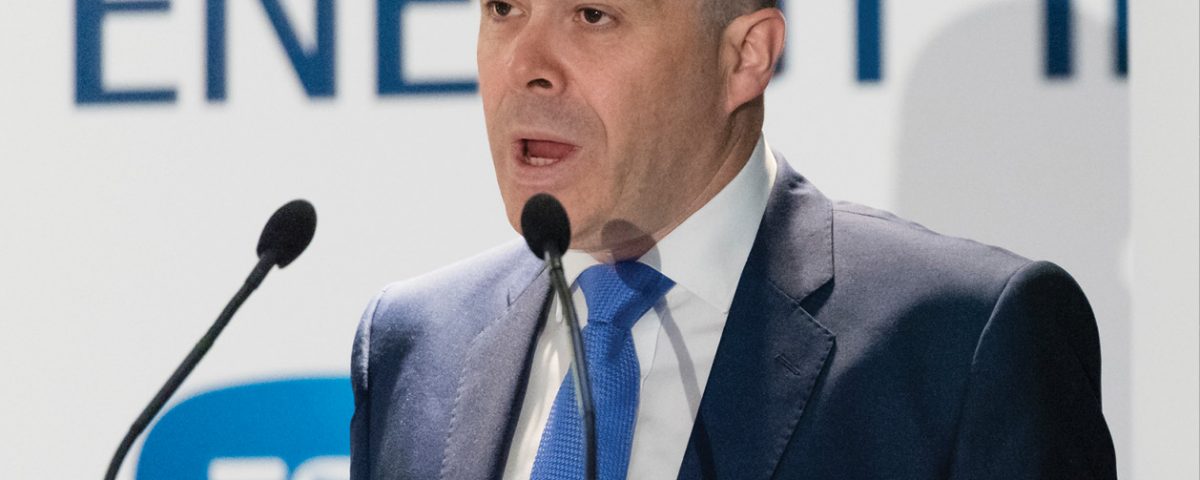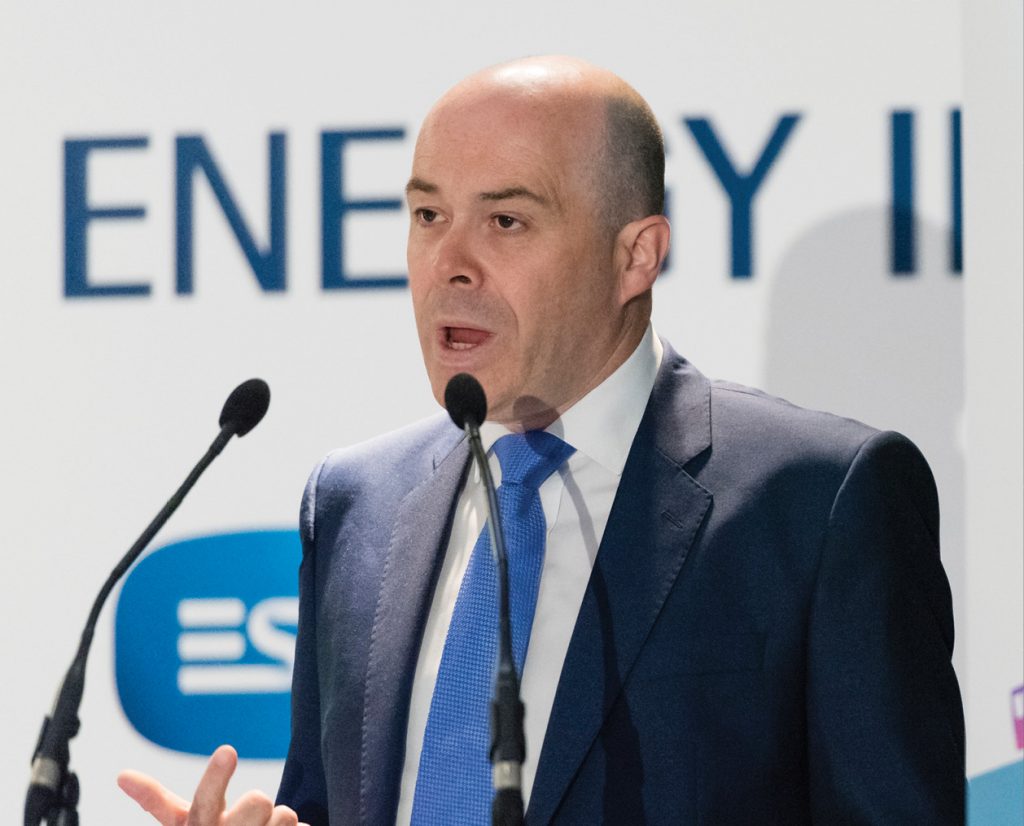
Closing the loop
9th November 2016
Energy Institute: Ireland 2050
30th November 2016Ireland is well on track to become a low carbon country


The government will meet its COP 21 agreements in full, according to Minister for Communications, Climate Action and Environment Denis Naughten TD.
“The expanded responsibilities of my own department reflect this reality,” said Minister Naughten.
“The establishment of the new structures within government are extremely progressive, as they recognise the stress which the new administration puts on climate change and all related matters.”
Naughten made these comments while delivering the keynote address to the 2016 Energy Ireland conference in Dublin. He confirmed that Ireland is well on its way to becoming a low-carbon country.
“The recent Paris agreements set a number of targets, where climate change is concerned. Chief among them is the need to keep global average temperature increases below 2°C above pre-industrial levels. The Irish government supports these objectives in full.”
Naughten admitted that a key element within the climate change mitigation package developed by the EU will be the 2030 emissions reduction target.
“We have already met the European Commission on this matter but we want a deal that is fair and technically feasible. It must also recognise the relative importance of agriculture within the Irish economy.”
The Minister pointed out that Ireland’s new Energy White Paper will put a policy framework in place that can take the country through to 2030. He said that it will strike a balance between sustainability, security of supply, competitiveness and the importance of the energy sector to economic growth and job creation.
Naughten continued: “We also need greater engagement with the public. The National Dialogue on Climate Change, within which I plan to encompass the proposed National Energy Forum, will be a key tool to providing public input into policy formation.”
Commenting on the need for Ireland to deliver on its declared aspiration to become a much more energy efficient country, the minister said that measures of this nature provide the most cost effective method of reducing emissions while providing tangible benefits to people.
He added: “A recent paper by the EU noted that over half of the boilers across Europe were installed over 20 years ago. Work undertaken by the SEAI estimates there could be as many as one million inefficient boilers still in use in Ireland. Actions like replacing inefficient boilers can reduce energy bills for people and help decarbonise our energy system.
“The public sector can lead the way in energy efficiency and I will soon be publishing a strategy for the continued improvement of energy efficiency in the public sector.
“Local authorities are among the largest energy users in the public sector, and public lighting accounts for the largest part of electricity use. I understand that there is the potential to halve our public lighting bill, freeing up much needed funds for other local authority activities. My Department is actively working with all 31 local authorities through the Public Lighting Steering Group to deliver this.
“This is the type of flagship project that can demonstrate, on the ground, the difference that the low-carbon transition can make for communities.”
Naughten said that government will also continue to support local authorities to upgrade housing through the housing capital programme and through his department’s better energy communities scheme, operated by SEAI, adding: “Many local authorities have already taken advantage of the scheme with some 260 community projects funded to date. This has seen community buildings, homes, charities, sports clubs and businesses, right across Ireland, benefit from energy efficiency upgrades.
“More than 320,000 homes in Ireland have received a government-supported energy efficiency upgrade. That’s nearly one in every five homes in the country. While this represents enormous progress, the next step is to support householders to undertake deeper energy upgrades to their homes. In order to kick start this, my department is preparing a pilot project to commence next year.”
“we will not achieve the necessary transition to a low-carbon energy future unless we travel that path together with the people and communities throughout the country.”
Naughten confirmed that recent years have seen the electricity sector make significant investment both in generation capacity and networks.
“My role as Minister is to set out national policy which establishes the need for infrastructure projects. An example of this is the need for increased interconnection with Northern Ireland. I would like to take this opportunity to confirm my support for this policy.
“In the case of the North-South Interconnector, a proposal has been made to meet this national policy need and it is currently being assessed by An Bord Pleanála.
“A further priority action for me is the need to update the wind farm planning guidelines. In order to do this, we need to strike a pragmatic balance between the need to cost effectively meet our 2020 renewable electricity target and meet the needs and wishes of the people in whose communities the energy infrastructure is developed.”
Naughten said that he is also working to develop a new support scheme for renewable electricity. As part of this work, analysis is ongoing on the types of technologies to be included such as biomass, wind, waste, solar and combined heat and power.
“These are complex issues and will take time necessitating the extension of the target for delivery from year end for this support scheme,” he said.
“In order to deliver this as quickly as possible, I intend to combine the two remaining planned consultations into a single consultation later this year. I will outline the broad details of the new scheme early next year with finalising of the scheme subject to State aid approval from the European Commission.”
He continued: “Supports for renewable electricity impact every person’s electricity bill via the Public Service Obligation. Recent reports of increases in the PSO levy has seen some negative coverage. Once again, I think all of us in this room need to better communicate the positive benefits brought about by the PSO and, in particular, the increase in domestically produced renewable electricity. It should also be noted that this is happening at a time when there are significant falls in the price of electricity for consumers.”
Naughten sees a real future for biomass produced in Ireland helping generate the low-carbon heat we need while also benefiting local farmers who produce the crops.
“In this regard, my Department will be launching the final phase of consultation on a Renewable Heat Incentive support scheme in the autumn. I see this support scheme as a catalyst to grow the bioenergy industry in Ireland. To further aid this growth, I look forward to working with Agriculture Minister Michael Creed and publishing a National Bioenergy Plan before the end of this year.
“In the transport sector, the increase in sustainability has principally been via the Biofuel Obligation which is placed on fuel suppliers. The obligation level will increase from 6 per cent to 8 per cent at the start of 2017. Further increases up to 2020 are currently being examined.
“In addition, the Programme for Government sets a goal for Ireland to become a leader in the take-up of electric vehicles. The use of compressed natural gas in heavy goods vehicles and public transport vehicles also has a role to play. I look forward to working closely with my colleague Minister Ross in examining the potential for deployment of alternative fuels in Ireland.”
Naughten concluded: “There is a great challenge ahead but we will not achieve the necessary transition to a low-carbon energy future unless we travel that path together with the people and communities throughout the country.”
